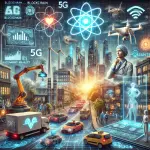As industries evolve, so do the skills required to thrive in the workplace. The future of work is marked by rapid technological advances, digital transformation, and a growing emphasis on skills like adaptability, problem-solving, and emotional intelligence. In this era of constant change, staying relevant requires more than just technical proficiency—it demands a commitment to lifelong learningand the development of essential soft skills.
With automation, AI, and remote work becoming increasingly dominant, workers and businesses alike must rethink traditional skill sets. How can professionals stay competitive in this shifting landscape? What skills will define future success? And how can organizations cultivate a workforce ready for the challenges and opportunities ahead?
The Changing Landscape: Why Workforce Skills Are Evolving
Technological advancements, especially in fields like AI, machine learning, and automation, are rapidly transforming industries. Many repetitive tasks are being automated, leaving room for workers to focus on more complex, creative, and strategic work. As a result, the future of work is centered around human-centered skillsthat machines cannot replicate—skills like critical thinking, creativity, leadership, and emotional intelligence.
Alongside these soft skills, digital proficiencyis now a must-have. Whether it's data analysis, digital marketing, or understanding AI tools, digital literacy has become essential across all industries. Workers who can leverage these technologies to enhance their roles will be the ones to thrive in the future.
The biggest takeaway? Adaptability is key. As industries continue to transform, the ability to learn new skills quickly and pivot will determine future success. Lifelong learning—the continuous pursuit of knowledge, upskilling, and reskilling—will become the norm for professionals.
Key Skills for the Future of Work:
- Soft Skills:
- Emotional Intelligence (EQ):As AI and automation take over technical tasks, the ability to understand, empathize, and communicate effectively will become even more critical. Workers with high EQ will excel in managing teams, fostering collaboration, and delivering customer-centric solutions.
- Leadership & Teamwork:Leading teams—especially in remote or hybrid setups—requires strong interpersonal skills, trust-building, and a collaborative mindset. Leadership isn't limited to managers; employees at all levels need these skills to navigate complex projects.
- Creativity & Problem-Solving:Automation is great at repetitive tasks, but it cannot replace human creativity. Problem-solving, thinking outside the box, and innovating will set employees apart as businesses seek new ways to overcome challenges.
- Digital Skills:
- Data Literacy:The ability to read, analyze, and make data-driven decisions is becoming crucial in nearly every field. From marketing to operations, businesses are increasingly relying on data insights to shape strategies.
- Technical Proficiency:Whether it's understanding AI algorithms or mastering cloud computing, digital skills will be necessary to navigate the future workforce. Workers who can embrace and implement these technologies will become valuable assets.
- Digital Communication:With the rise of remote work, digital communication tools (Slack, Zoom, Microsoft Teams) are more vital than ever. Knowing how to communicate effectively and collaborate digitally is an essential skill for the modern worker.
- Adaptability & Lifelong Learning:
- Lifelong Learning Mindset:The speed of technological change requires a growth mindset. Continuous learning—whether through formal courses, certifications, or self-study—will be a core requirement for staying relevant.
- Reskilling & Upskilling:Industries are rapidly evolving, which means the once valuable skills may become obsolete. Investing in reskilling (learning new skills) and upskilling (enhancing existing ones) will be key to navigating career growth in a changing landscape.
How Organizations Can Prepare:
- Foster a Culture of Continuous Learning:
- Businesses must encourage employees to adopt a mindset of lifelong learning by offering growth opportunities. This could be in the form of online courses, in-house training, or mentorship programs. Leaders should lead by example by prioritizing learning and skill development themselves.
- Invest in Reskilling Programs:
- With the rapid pace of technological change, businesses must invest in reskilling initiatives to ensure their workforce remains competitive. Whether through partnerships with educational institutions or internal training programs, providing employees with the tools to reskill will be essential.
- Leverage AI & Technology for Development:
- AI can play a powerful role in assessing skills gaps, personalizing training programs, and providing real-time feedback to employees. By integrating technology into development strategies, companies can ensure employees are ready for the future of work.
- Promote Digital Skills Across All Levels:
- Digital literacy isn't just for technical roles. Every employee, from marketing to HR, should be equipped with digital tools that enhance productivity and decision-making. Businesses need to prioritize digital skills training as part of their core development programs.
The Role of Leaders in Navigating the Future of Work:
Leaders will play a crucial role in shaping the future workforce. Beyond simply managing teams, they will need to act as mentors, guiding employees through change, fostering a culture of learning, and ensuring a smooth transition into more technologically driven workplaces.
Forward-thinking leaders will focus on developing their teams' human skills—building resilience, emotional intelligence, and creativity—while simultaneously ensuring they are equipped with the digital skills necessary for the future. Leadership will be about inclusion, ensuring that no one is left behind in this digital transformation.
The future of work will not be defined solely by technology but by the skillsthat individuals and organizations develop to navigate change. Whether it’s through emotional intelligence, digital proficiency, or a commitment to lifelong learning, the skills of tomorrow are already taking shape today.
For professionals, the path forward is clear: stay curious, embrace continuous learning, and focus on both soft and digital skills. For businesses, the goal is to create a learning culture that empowers employees to thrive in a rapidly evolving world.










